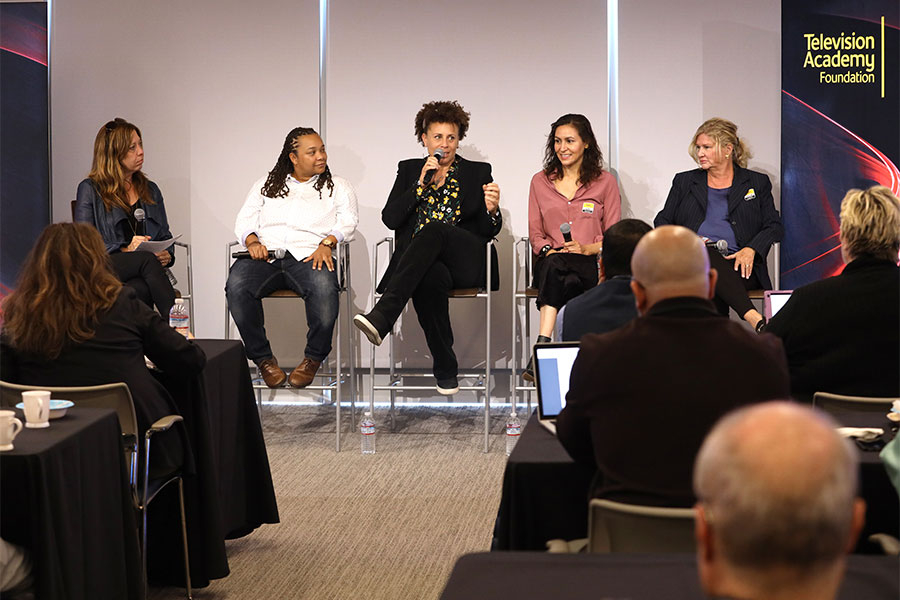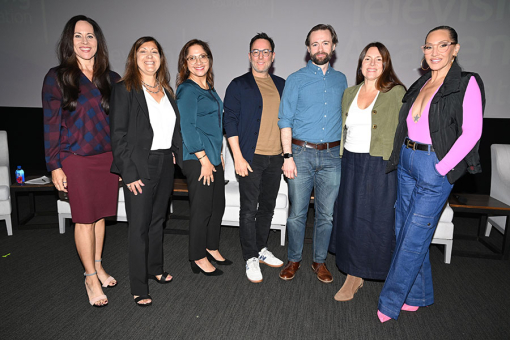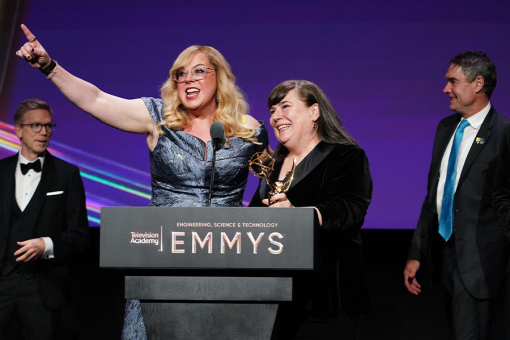For more than 30 years, the Television Academy Foundation has brought together college and university media arts instructors for its annual Faculty Seminar, offering panels, field trips, demonstrations from industry pros and an insider's view of the television business aimed at keeping their curricula current and equipping their students for television careers.
This year, Foundation leaders amped up this educational opportunity, changing the format to a three-day conference and tripling the number of participants from 25, who'd been chosen from a field of applicants, to 74, who signed up online for the summit.
View the photo gallery from this year's Faculty Seminar.
From November 4 – 6, instructors from throughout the United States gathered at the Saban Media Center at the Academy's North Hollywood headquarters. They engaged with leading television executives and creators on a myriad of subjects: pitching shows, creating pilots, laying the groundwork for writing and directing careers, updates on unscripted television, post-production, intersectionality and gender parity, content creation that's imbued with diversity and inclusion via the Star Trek franchise, how to use and maximize the Foundation's online oral history archive, the Interviews in the classroom. They also networked and shared information as colleagues, another valuable benefit.
"Given the vast changes to our industry, we need to ensure that faculty are armed with the latest trends, business cases and information to better equip the next generation of creators and executives," explained Foundation chair Madeline Di Nonno. "The best way to do that was to change the format of the Faculty Seminar and make it available to more educators." Di Nonno, who is also CEO of the Geena Davis Institute on Gender in Media presented a section and her expertise on best practices in achieving intersectionality.
The long road to getting a show produced was the focus of "The Pitch: Best Practices for Shopping an Idea," addressed by Kalia Booker, director, Drama Programming, HBO; Steven Canals, creator-executive producer-writer-director of the FX drama Pose; Jaime Dávila, president and co-founder, Campanario Entertainment, whose projects include the upcoming Amazon Prime comedy How to Survive Being Single and Netflix's Selena: the Series. Danielle Turchian, senior features editor at Variety, moderated the illuminating discussion.
The stakes are certainly high for all concerned. "You're basically asking the person in that room to give you millions of dollars to make your dream come true," Dávila pointed out.
While each pitch should last just 30 minutes and be tailored specifically to a project, Canals said, passion for every project is critically important. "So at the top of every pitch that I give, I'm always talking about who I am, what is my background, how am I locating myself within the narrative, so that the execs in the room have a sense of why this story is important to me, and what I specifically, as a creator, am bringing to the project," he said.
Agreed Dávila, "[The pitch] has to be a really good combination of passion, storytelling, character growth potential, season growth potential."
Because television is such an intimate medium, a successful pitch at HBO goes far deeper than just structure and character descriptions, Booker noted.
"Most of the time [the meeting] is going to be very esoteric and very deep," she said. "We're going to ask you the conversations that you're going to start in the community. We're going to talk about, at the last frame of the very last episode, when it goes to black, what do you want people to be feeling who are sitting on their couch in that intimate space? What do you think that this show is driving at?"
Show why you are the only person who can tell the story and understand the characters and context, Dávila advised, and present the universality of the project. And as Canals noted, know what type of material each network or streaming service takes or doesn't want.
There are some inroads being made when it comes to diversity in development. "I'm the first black woman ever to be on the HBO programming team," Booker said. "There's a Pakistani man on my team, there's a Korean-American woman, a gay man. We are trying to reflect the world around us so we can make shows that reflect the world around us."
That has been a hallmark of the Star Trek television and film franchise since the original 1966-1969 series, when the crew of the USS Enterprise included a female African-American communications specialist, Uhura, (played by Nichelle Nichols) and an Asian-American physicist, Sulu (George Takei) – plus, of course, a half-human, half-alien Vulcan first officer, Spock (Leonard Nimoy). A kiss between Uhura and Captain James T. Kirk (William Shatner) became the first interracial kiss on television.
The impact of the franchise past and present was explored in the panel "The Power of TV: Star Trek, 50 Years of Diversity & Inclusion." the Foundation's "Power of TV" series, usually ticketed public events, was created in 2017 to celebrate television's ability to inspire social change.
Panelists included Alex Kurtzman, executive producer of Star Trek live action and animated series and a shorts anthology project for the CBS All Access streaming platform; Jenny Lumet, executive producer, Star Trek: Discovery and co-executive producer, Star Trek: Picard; and Michelle Paradise, executive producer- showrunner, Star Trek: Discovery. Sarah Rodman, features editor at Entertainment Weekly, was moderator.
Kurtzman recounted a pivotal moment in his involvement with Star Trek: Discovery. Backstage at New York Comic Con, just days after the series' 2017 launch, he was speaking with Discovery panelist and former astronaut Dr. Mae Jemison, the first African-American woman in space.
"At one point I said, 'So, an astronaut – Why? How? What made you ...?' And she said, 'Uhura. I saw Uhura, and I wanted to go to the stars.'
"And it hit me so profoundly in that moment, that Star Trek has that kind of impact. I recognized that part of why this beautiful franchise has existed for over 50 years is because it keeps reaching out, and it keeps inspiring people to do real things in the world.
"And the idea that our best selves will emerge in the future, that all of the things that we deal with all day long now [in real life] are no longer conversations on Star Trek: diversity and sexual orientation and gender and age. All of these things are assumptions; they're never discussed, and to me that is [creator Gene] Roddenberry's most beautiful contribution to the conversation about diversity, that it should be an assumption. I feel like we have this amazing opportunity now [to reflect that], where we're reaching more and more people, and the world needs it now more than ever."
Lumet was also inspired by Uhura. "I found it thrilling that she was responsible. She was the hub through which everybody spoke to each other," she recalled. "And that's fantastic, right? She was the communicator. It was like nothing could happen unless it went through her."
"I wanted to make sure that because Star Trek had not been on television in 12 years …it was going to be something very special," Kurtzman related. "We had to have a reason, not just because it was Star Trek, but there was a reason to tell that particular story. And the first thing that [fellow creator-executive producer] Bryan Fuller and I had instant agreement on was, the lead had to be a woman of color. Whether she was the captain or not was less the point." the result -- Sonequa Martin-Green was cast as anthropologist Michael Burnham in Star Trek: Discovery, the first African-American woman to play the lead on a Star Trek franchise.
Discovery also features the first Star Trek gay couple, another conscious decision of Kurtzman and Fuller: science officer-chief engineer Paul Stamets (Anthony Rapp) and medical officer Dr. Hugh Culber (Wilson Cruz). The characters, who are married, are both portrayed by actors who are openly gay. The two had been struggling after Culber was killed, but then in the sci-fi world, resurrected; now they're back together and living a regular married life.
"It's a privilege to get to write for them," Paradise said. "It's not that there's no more struggle. It's, what is the next iteration for them, and how are they growing together? And that's been such a wonderful thing to do. Every time we go to an event or a panel, inevitably someone will stand up and make a comment about that, and how much it means to them to be able to see themselves represented. And as a member of the community myself, it's meaningful for me to get to participate in writing them."
The Faculty Seminar instructors marveled at their access to these and other top industry participants, and at the wealth of knowledge they will bring back to their students. Said Tony Atwater, Ph.D, a professor in the Mass Communications and Journalism Department at Norfolk State University in Norfolk, Virginia, "This is a very stimulating seminar for faculty. It provides us firsthand knowledge of what's going on, by the people who are actually doing it. I've written down nuggets of takeaways that will help me to better advise my students as they go into this competitive field."
Adriana Brogger, an associate professor who teaches radio and television and digital media at San Joaquin Delta College in Stockton, California, found the seminar "inspiring, motivating and very exciting. Teaching at a community college in Stockton, which has been given dubious titles such as 'the most dangerous city' by Forbes, it's sometimes really tricky to keep that creative artist engaged, and encourage them that they really can do this. I'm going back with so many ideas, so much new energy to say, 'You can do this.'"
And for her part, says Foundation executive director Jodi Delaney, "We really honor the work of the educators; the fact that they get on airplanes and come out to expand their knowledge means a lot to us. We want to be sure that we deliver what they need. It's gratifying to hear such positive response to this reinvention of Faculty Seminar: the Conference, and know that what they take back will have great impact. for us, it's always about the next generation."











